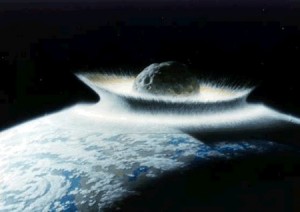It is the tragedy of our age that the more scientific knowledge expands, the less meaning human life has. Science simply cannot replace the religious impulse, which is distinct from its bastardization, the belief systems of organized religions.
 Human beings have a universal drive for wholeness and immanence. Faith and tradition used to supply a semblance of meaning and coherence, but they are gone. Not just because science has rendered religion superstition, but also because belief systems have become irrelevant, eroded away in a consumeristic, hyper-connected world.
Human beings have a universal drive for wholeness and immanence. Faith and tradition used to supply a semblance of meaning and coherence, but they are gone. Not just because science has rendered religion superstition, but also because belief systems have become irrelevant, eroded away in a consumeristic, hyper-connected world.
The increasing irrelevance of faiths and traditions also springs from the simple fact that the adolescence of humanity is over, but most people refuse to grow up. Clinging to beliefs and identifications as a reaction to the pace of change is only accelerating the erosion of character, with its vacuity of ‘personal spiritual paths.’
Science cannot fill the vacuum. And philosophy has become science’s sidekick, a hidebound specialization given over to internal intellectual debates about issues that are either irrelevant or nonexistent. New insights are urgently needed, yet the arcane categories of Western philosophy’s history insure that intellectual encrustation continues and spiritual confusion reigns.
Attempting to replace the religious impulse with the rationality of science is as inadequate as “clinging to guns and religion,” to use Barack Obama’s infamous campaign words. The antipathy toward Obama and all he projectively represents stems from his audacity to mumble the truth about the growing and dangerous ranks of the guns and religion mob in American political culture.
Is there nothing that can be done until the entire edifice of western civilization or even human civilization comes  crashing down? Many people, including prominent academics, hold the view that man is unregenerate, and it will take a catastrophe that reduces human numbers by a significant percentage for humans to have a chance to live in harmony with the earth and each other. That reflects a deeply dismaying and self-fulfilling misanthropy.
crashing down? Many people, including prominent academics, hold the view that man is unregenerate, and it will take a catastrophe that reduces human numbers by a significant percentage for humans to have a chance to live in harmony with the earth and each other. That reflects a deeply dismaying and self-fulfilling misanthropy.
Yet many so-called educated people openly wish for such a catastrophe. I spoke with a professor at the University of Michigan recently who is one of the proponents of the eco-philosophy movement. It seemed to have some sound premises, until I read, and he confirmed in our talk his view that: “If we are so stupid as to commit collective suicide, so be it. But it is a tragedy that so many other innocent beings must suffer and die as well.”
When a philosopher expresses such views, it’s hard to see any hope for humanity. Posing as false humility, this perspective of humankind’s place in nature and the universe completely misses the mark.
In this column I’ve consistently tried to give a coherent philosophy that accounts for both man’s destructiveness, and the human being’s potential. They clearly go together, because the very fact that a single species has the power to decimate one of the most beautiful planets in the galaxy attests to the fact that something more than survival of the fittest is unfolding with humankind.
Science, backed by the rump of philosophy, still upholds the mechanistic view that life and consciousness are simply a matter of chance, random protuberances in a pitiless void. Such a view sustains and gives succor to man’s greed and rapaciousness, since if there is nothing but chance and material existence, why not rape and pillage (within the law of course) during one’s short, meaningless span?
 Science is catapulting humanity into a machine-like future, while philosophy is caught in the brambles and nettles of its own illusory progression. Even so, the place to start is with philosophy, because philosophy, life affirming or nihilistic, effective or irrelevant, underlies all human activity.
Science is catapulting humanity into a machine-like future, while philosophy is caught in the brambles and nettles of its own illusory progression. Even so, the place to start is with philosophy, because philosophy, life affirming or nihilistic, effective or irrelevant, underlies all human activity.
Can science bring immensity? No, science reduces, necessarily, everything to the realm of knowledge. That’s fitting and proper for knowledge, but knowledge, however accurate and extensive, is just one dimension, not the totality of human existence. And if scientific knowledge is the criterion for religious experiencing, then there can be no such thing.
Giving lip service to questions of faith and belief, while relentlessly promoting the idea that life can be understood by reducing it to genetic and evolutionary particulates, is intellectually dishonest and spiritually destructive.
In a very real sense, science has become not the antidote to superstition and irrationality that the vast majority of scientists and philosophers believe it to be, but a catalyst for superstition and irrationality. That’s because when science, with the complicity of philosophy, arrogates to itself areas of human life that don’t belong to it, the vacuum of wholeness and meaning is filled by all kinds of religiously reactionary, New Age, or other nonsense.
As any regular reader of this column knows, I’m certainly not advocating obeisance to belief systems and organized religion. They have about as much to do with religious impulse and insight as quantum physics does (even when you include “spooky action at a distance”).
Can philosophy bring immensity? No, but philosophy can hold science to its rightful place and promote inner insight. It can thereby point toward immensity, which is beyond the intellect and has nothing to do with belief systems.
An ongoing critique of science’s application is what the global society needs and philosophy can supply, not genuflections to it.
Martin LeFevre

